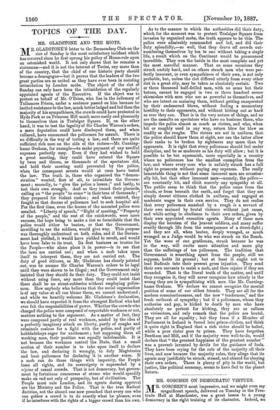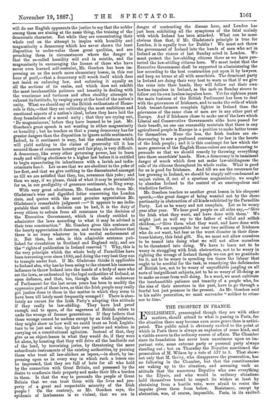MR. GOSCHEN ON DEMOCRATIC VIRTUES.
MR. OOSCHEN'S most impressive, and we might even say magnificent speech, delivered on Tuesday in the Free- trade Hall at Manchester, was a great lesson to a young democracy in the right training of its character. Indeed, we
will do our English opponents the justice to say that the nobler among them are aiming at the same thing, the training of the democratic character. But while they are concentrating their whole zeal on the attempt to inspire with humility and magnanimity a democracy which has never shown the least disposition to under-value those great qualities, and are preaching them in circumstances where the danger is that the so-called humility will end in suicide, and the magnanimity in encouraging the license of those who have never even learned self-restraint, Mr. Goschen has been im- pressing on us the much more elementary lesson, in this our hour of peril,—that a democracy will wreck itself which does not insist on enforcing law, and enforcing it equally on all the sections of its realm, and which does not exhibit the most inexhaustible patience and tenacity in dealing with the wearisome and tortuous and often stealthy attempts to exhaust its fortitude, by rasping away at the bond of the nation's unity. What we should say of the British enthusiasts of Home- rule is this,—that they are cultivating the most ambitious and emotional aspects of a nation's ideal, before they have laid the deep foundations of a moral unity ; that they are crying out, Be magnanimous,' before they have learned to be just. Mr. Goschen's great speech is not wanting in either magnanimity or humility ; but he teaches us that a young democracy has far greater dangers than the disposition to ignore noble sentiments. Indeed, to it sentiment is easy, but the steadfastness which will yield nothing to the claims of generosity till it has secured those of common honesty and fair play, is very difficult. A democracy, like every other governing power, has to learn ready and willing obedience to a higher law before it is entitled to begin squandering its inheritance with a lavish and indis- criminate hand. Let us see that we are obedient to the yoke of law first, and that we give nothing to the discontented amongst us till we are satisfied that they, too, reverence this yoke ; and then we may, if we please, think of what it may be permissible for us, in our prodigality of generous sentiment, to fling away.
With very great adroitness, Mr. Goschen starts from Mr. Gladstone's wise and dignified letter concerning the London riots, and quotes with the most genuine appreciation Mr. Gladstone's remarkable judgment :—" It appears to me indis- putable that until a decision can be had, it is the duty of every citizen to refrain from all resistance to the decision of the Executive Government, which is clearly entitled to administer the laws according to what it may be advised is their true construction." Mr. Goschen gives this sentence all the hearty appreciation it deserves, and warns his audience that there is no irony whatever in his cordial endorsement of it. But then, he asks, is this admirable sentence pub- lished for circulation in Scotland and England only, and are the "rights of publication in Ireland reserved "? Why, this is the very principle which the whole body of Parnellites have been traversing ever since 1880, and doing the very beet they can to trample under foot. If Mr. Gladstone thinks it applicable to Ireland also, why has he been using to the utmost his immense influence to throw Ireland into the hands of a body of men who set the laws, as understood by the legal authorities of Ireland, at open defiance, and that, too, though the whole endeavour of Parliament for the last seven years has been to modify the oppressive part of these laws, so that the Irish people may really get justice done to them in the matter in which they seem to have been till lately most frequently wronged ? There is abso- lutely no excuse for the Irish Party's adopting this attitude if they really be law-abiding. They have had proof enough and to spare, of the eagerness of British rulers to undo the wrongs of former generations. If they believe that these wrongs cannot be undone except by an Irish Legislature, they might show us how well we could trust an Irish Legisla- ture to be just and wise, by their own justice and wisdom in carrying on a constitutional agitation. Instead of that, they give us an object-lesson in what they would do, if they were let alone, by boasting that they will drive all the landlords out of the land, by terrorising juries, by threatening the mere subordinate instruments of the existing authorities, by praising those who treat all law-abiders as lepers,—in short, by im- pressing upon us in every way in which such a lesson can be impressed, that they are full of hate for all who hold by the connection with Great Britain, and possessed by the desire to confiscate their property and make their life a burden to them. Is that the way to persuade the people of Great Britain that we can trust them with the lives and pro- perty of a great and respectable minority of the Irish people ? On the contrary, as Mr. Goschen says, the epidemic of lawlessness is so violent, that we are in danger of contracting the disease here, and London has just been exhibiting all the symptoms of the fatal malady with which Ireland has been attacked. What can be more obvious than that, if Mr. Gladstone's principle is true for London, it is equally true for Dublin f We must not throw the government of Ireland into the hands of men who act in Ireland as the rioters of last Sunday acted in London. We must protect the law-abiding citizens there as we have pro- tected the law-abiding citizens here. We must insist that the Executive Government shall be supported in administering the law according to the best construction put upon it by lawyers, and keep no terms at all with anarchists. The dominant party in Ireland are doing their very best to warn us that if we give the reins into their hands, they will follow out their own. lawless impulses in Ireland, as the mob on Sunday strove to follow out its own lawless impulses here. Yet for eighteen years the main business of the British Parliament has been to deal with the grievances of Irishmen, and to make the evils of which Irish tenant-farmers complain lighter in Ireland than the grievances of the same class of men are in any other part of Europe. And if Irishmen chose to make use of the laws which Liberal and Conservative Governments alike have passed for their benefit, no one can reasonably maintain that there is any agricultural people in Europe in a position to make better terms for themselves. None the less, the Irish leaders are en- deavouring to sow a profound contempt for law in the hearts of the Irish people ; and it is this contempt for law which the more generous of the English Home-rulers are endeavouring to persuade us that we should remedy by throwing everything, into these anarchists' hands. Now, a democracy is in imminent danger of wreck which does not make law-abidingness the rule of its citizens throughout its whole realm. What is good for us is good for Irishmen. And till we see the reverence for law growing in Ireland, we should be simply self-condemned as unjust rulers, if, out of a spurious magnanimity, we sought• to abandon Ireland to the control of an unscrupulous and' vindictive faction.
Mr. Goschen teaches us another great lesson in his eloquent speech,—the great danger of being wearied out by the sheer. pertinacity in obstruction of all kinds exhibited by the Parnellite Party. Let us be weary and not complain. Let us be weary
year after year. We hear good people on all sides Give the Irish what they want, and have done with them.' WO might just as well say to the father of wilful and selfish. children,—' Give them what they want, and have done with them.' We are responsible for near two millions of Irishmen who do not want, but fear as the worst disaster in their dime- trous history, this fatal gift. No, we must not allow ourselves to be teased into doing what we will not allow ourselves to be threatened into doing. We have to learn not to be weary in struggling with Irish obstruction, not to be weary in righting the wrongs of Ireland though we can get no gratitude for it, not to be weary in spending ten times the labour that ought to be needful for the task, in remedying the deficiencies of British law, not to be weary of unprofitable jangling on all sorts of insignificant subjects, not to be so weary of ill-doing as to make us cease from well-doing. In a word, we must cultivate the inexhaustible patience and tenacity of a people who, for the sins of their ancestors in the past, have to go through a fearful but just penance in the present. As Mr. Goschen said in his noble peroration, we must surrender " neither to crime nor to time."
























































 Previous page
Previous page